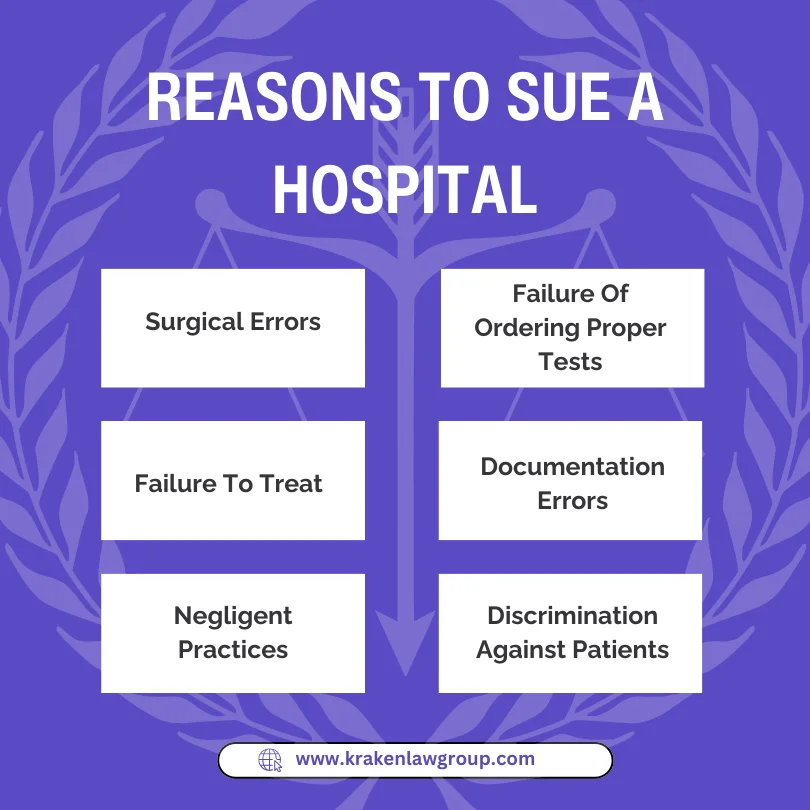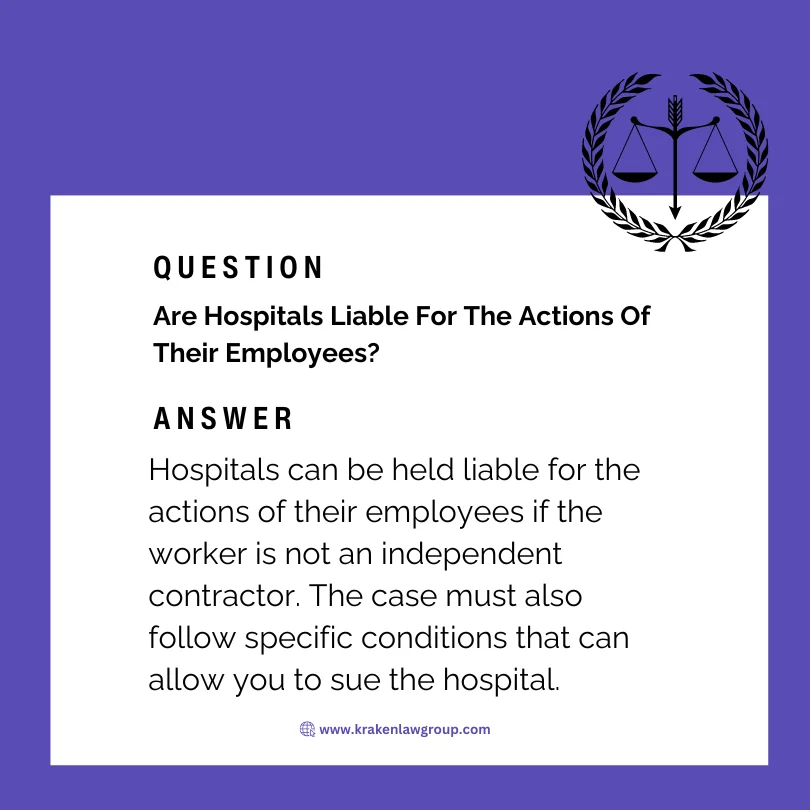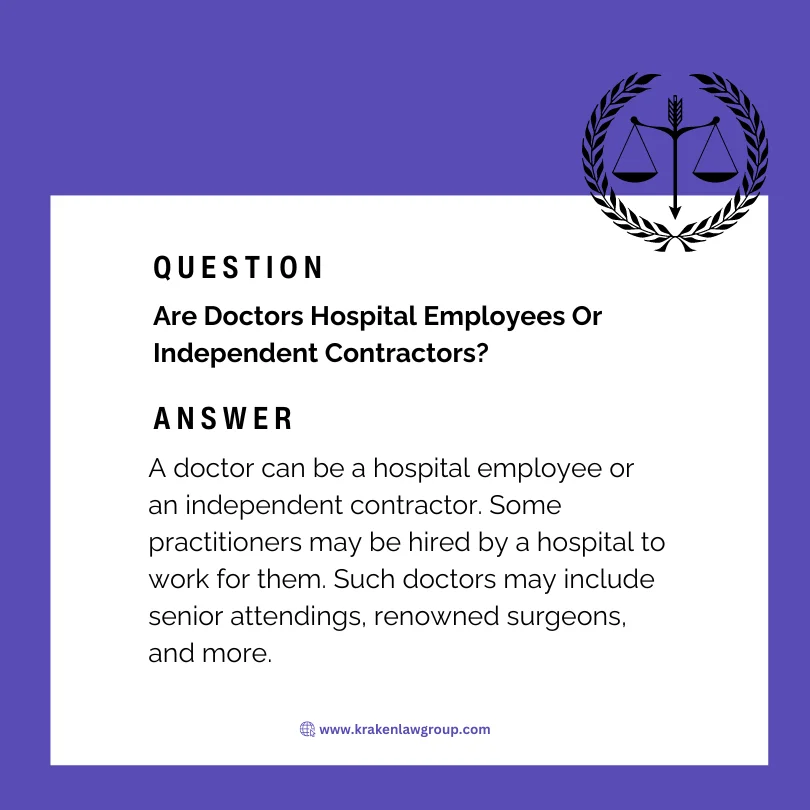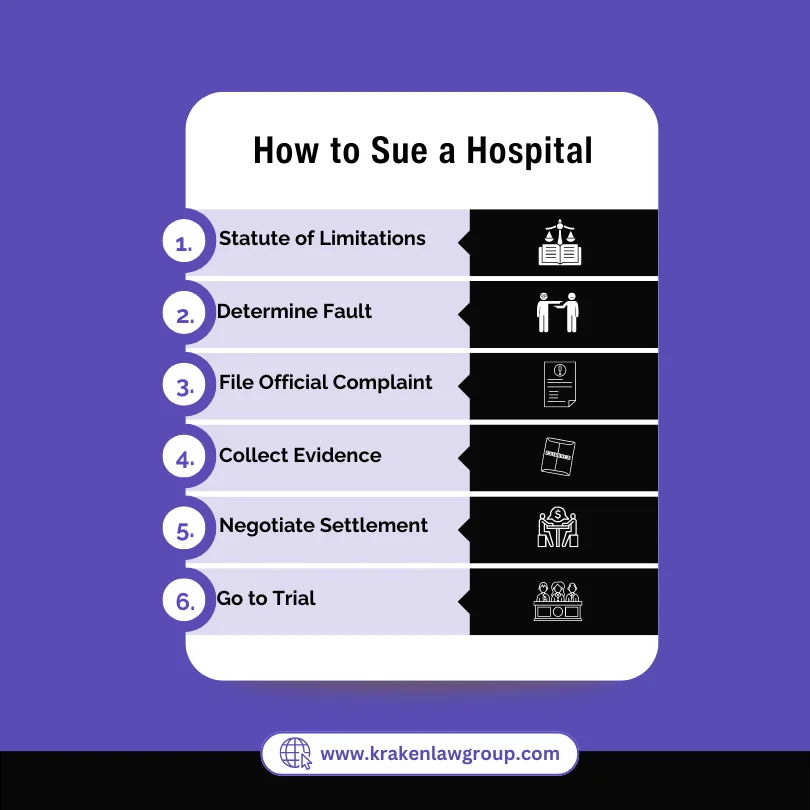A hospital is a place that people trust to get the right treatment for their medical conditions. However, what should you do when a sacred place such as a hospital breaks your trust?
For example, a doctor may cause a fatal injury to your loved one during a minor surgery. Such cases come under medical malpractice, which is a serious crime.
If you want to learn how to sue a hospital for medical malpractice, don’t go any further. Let’s look at everything about it in detail below.
Reasons To Sue A Hospital

There are many reasons for which you may learn how to sue a hospital. The reasons may be different but the suing procedure remains the same.
Here are the top six reasons for which most people sue a hospital:
1. Surgical Errors
About 4,000 surgical errors occur in the US every year. These errors can be made by any hospital staff during surgery. For example, a surgeon may damage one of your important nerves during the procedure.
This mistake can cause you to suffer from complete or partial body paralysis for a lifetime. They may also cut an artery leading to uncontrolled blood loss on the table. Such loss may cause the patient to lose their life.
If you’ve experienced a surgical error in a hospital, you can hold them liable for the injury. Filing a legal complaint against the healthcare center is best for preventing such mistakes in the future.
You may also bring about a positive change in that hospital regarding hiring and other practices. The complaint will also help you seek financial compensation for your injuries.
2. Failure Of Ordering Proper Tests
Hospitals are efficient at diagnosing different diseases. However, that is not true in all cases. Sometimes a doctor may miss important symptoms of your disease.
So they may not order proper tests to diagnose you. This is also true if you’re suffering from a rare condition not commonly seen in the US. You may also arrive at a hospital in an emergency condition after a car crash.
The on-call doctor may forget to perform a CT scan to rule out head trauma or brain injury before taking you to surgery. This is an important scan that hospitals must perform immediately in car crash cases.
Whatever the error, the overall result would be the failure of the doctor to diagnose your condition properly. If you lose your life due to such an error, your family must know how to sue a hospital for malpractice.
In cases where you suffer from a bodily impairment, but not loss of life, you can file a complaint against the relevant doctor. This is why it is important to know how to sue a hospital.
3. Failure To Treat
Another reason behind suing for medical negligence is failure to treat. A doctor may overlook medicines that can help you effectively heal from a condition.
They may also prescribe you incorrect medicines, leading to adverse effects. The result of both examples is your condition will worsen instead of improving.
This is why hospital staff must be competent enough with proper pharmacology knowledge. If they fail to treat you due to a lack of awareness about drugs, you can hold them liable.
4. Documentation Errors
Documentation errors can also require you to learn how to sue a hospital. A doctor may note symptoms incorrectly when taking the patient’s history.
They may also make errors in noting other information such as allergies. For example, a doctor may prescribe a medicine that the patient has told them they’re allergic to.
You can file a case against the practitioner for such an error. Another documentation mistake a doctor can make is writing an incorrect drug dosage.
Such an error is one of the most common causes of overdose in hospitals. In the US, about 7,000 to 9,000 patients die annually because of medication errors.
This is why you must learn how to sue a hospital for documentation errors.
5. Negligent Practices
Suing for medical negligence is easy if you know how to sue a hospital and identify malpractice. Remember every malpractice case is not of a mistake made by a doctor.
Sometimes the hospital may be at fault for medical malpractice. The center may be involved in negligent practices such as:
- Not performing background checks to determine whether an employee they’re hiring is competent
- Hiring a doctor while knowing that they may be a threat to patients
- Making staff overwork daily
Such negligent practices can lead to medical errors more often at a specific hospital.
If you’ve identified such a pattern, you must hire a hospital malpractice lawyer to start a lawsuit.
6. Discrimination Against Patients
Another common reason to sue a hospital is discrimination against patients. A doctor may refuse to treat you because of your race or past criminal history.
They may also engage in religious discrimination at the hospital. Some doctors show bias against people from the LGBTQIA+ community.
Whatever the reason behind discrimination, the act may delay your treatment. This can cause you to suffer from physical pain or emotional trauma.
You may also experience impairment because of the delayed treatment. So hire a hospital malpractice lawyer to fight a malpractice and discrimination claim against the hospital.
Are Hospitals Liable For The Actions Of Their Employees?

Hospitals can be held liable for the actions of their employees if the worker is not an independent contractor. The case must also follow specific conditions that can allow you to sue the hospital.
For example, if a clerk at a hospital makes an error on your medical record, you may sue the institute. This is especially true if the mistake prevented you from receiving proper treatment.
A senior doctor or board member of the hospital may also give bad instructions to an attending on-call. In such cases, you may sue the hospital and the doctor following the orders which led to malpractice.
Hospitals can also be held liable if they fail to provide accommodations to their employees to offer proper medical care.
For example, hospital staff may be using low-quality sterilizing equipment leading to a lack of a clean environment. This can cause patients to acquire infections easily after surgeries.
So while the staff may be responsible for using improper equipment, you can sue the hospital for not changing the tools.
That is why the conditions of the situation will determine whether a hospital can be held liable for its employees.
Are Doctors Hospital Employees Or Independent Contractors?

A doctor can be a hospital employee or an independent contractor. Some practitioners may be hired by a hospital to work for them. Such doctors may include senior attendings, renowned surgeons, and more.
Meanwhile, other doctors at a hospital may be independent contractors. This means they’re not a full-time employee of the institute. The hospital will only be taking care of the bills and logistics of that doctor.
Independent contractors sign a contract with specific hospitals. Such doctors usually have a private practice and may be granted privileges to admit their patients to a hospital they have a contract with.
You may consider both types of doctors to be the same, but you’ll understand the difference when it comes to liability. Victims can sue a hospital for malpractice if their employee made an error.
However, you cannot sue a hospital if you’re injured at the institute by an independent contractor. That is why consulting a lawyer about how to sue a hospital may help you.
Situations Where Hospitals Can Be Liable For Non-Employee Doctors
Let’s look at the top two situations in which you can sue a hospital for an error made by a non-employee doctor:
The Hospital Appeared As The Practitioner’s Employer
A hospital must clarify to the patients that the doctor treating them is not an employee before their treatment begins. Typically, a hospital must do this by disclosing independent contractor information with:
- The patient’s admission paperwork
- Surgical consent forms
- Other treatment-related consent forms
If the hospital you received treatment from didn’t disclose the doctor treating you as an independent contractor, you can hold them liable.
That is because a lack of disclosures will lead to the doctor being treated as an employee by the law.
The Hospital Gave Privileges To An Incompetent Doctor
Many states have laws against hospitals that give staff privileges to incompetent doctors. This is regardless of whether the doctor is an independent contractor.
The hospital can also be held liable if they know a formerly safe surgeon has become a threat to patients. For example, an institute’s management may be aware that a doctor has been abusing alcohol.
Despite that, they gave privileges to that doctor for performing surgery in the hospital. As a victim, you may file a case against the non-employee surgeon and the hospital.
Grounds For A Medical Malpractice Claim Lawsuit
Before you can learn how to sue a hospital, you must understand the grounds for malpractice lawsuits. These include:
- A hospital hired incompetent staff
- The medical practitioner breached the duty of care
- The duty breach caused significant damage to the patient
If these three criteria are met together, you will have grounds to start a medical malpractice lawsuit.
The Proof For A Medical Lawsuit
One of the top aspects of how to file a lawsuit against a hospital includes having evidence. That is because every treatment ending with an unfavorable outcome is not due to malpractice.
Sometimes a patient may be terminally ill, which is why they may lose their life in a risky surgery. This is why a victim must prove three things if they’re learning how to sue a hospital:
- The patient was bound to receive care by legal responsibility
- Treatment and medical decisions by the hospital were below the standard care level
- The action or omission led to significant damages
Suing A Hospital For Emotional Distress: Is This Possible?
You can sue a hospital for emotional distress if the practitioner’s negligence led to the suffering. Plaintiffs must prove the exact cause of the emotional trauma was the hospital.
For example, a hospital may have offered you incorrect medications leading to drug addiction. Recovering from the addiction can be mentally exhausting and disturb your emotional health.
If you can prove the action, you will have grounds for suing for medical negligence.
How To Sue A Hospital For Negligence Or Medical Malpractice: Step By Step Guide

Let’s look at the top steps you must follow to learn how to sue a hospital:
1. Ensure The Statute Of Limitations Is Valid
Learning how to sue a hospital would be futile if your case has exceeded the statute of limitations. This is a legal time limit that every person must ensure is valid before starting a case.
If your malpractice claim’s statute of limitations has passed, the court would reject the lawsuit before it even begins. This limit is two years in Florida.
The victim may have four years if the injury wasn’t known to them initially. In such cases, you will have two years to start a case after the malpractice discovery.
For example, you may have suffered from a surgical injury that the hospital hid from you. One year later during another surgery at a different hospital, you may come to know about the injury.
Once you know about the injury you’ll have two years to start the case. This means your overall statute of limitations was three years.
If you discover malpractice after four years, you may not have a valid claim in Florida. Consulting a hospital malpractice lawyer would help you with this.
2. Determine The Fault
An important step in how to sue a hospital is determining who to sue. You must understand whether the fault was of a doctor’s or the hospital’s.
If it was of the doctor, you must understand whether they were an employee or not.
That is because a hospital would be liable for their employee’s mistakes. However, you cannot sue the institute for a non-employee’s errors.
This is especially true if the hospital told you the doctor was an independent contractor. The at-fault party may also be a:
- Nurse
- Medical aide
- Physical therapist
- Pharmacist
- EMT
- Cleaning staff
Once you figure out the at-fault party, you can file a complaint against them with a hospital malpractice lawyer easily.
3. File An Official Complaint Through A Lawyer
It is important to have a medical malpractice lawyer by your side before you can file an official complaint. The attorney will prepare an official document outlining the hospital’s fault and negligence.
They will also include all the damages you’re seeking compensation for. These may be:
- Impairment
- Loss of quality of life
- Unnecessary medical expenses
- Pain and emotional suffering
- Out-of-pocket expenses
- Lost wages
- Loss of a loved one
There are many more damages that your lawyer can outline in the document, depending on your case. Meanwhile, some of these damages may not apply to your case.
This is why you must track all your expenses when learning how to sue a hospital. Once an official complaint is filed, the hospital or doctor will be notified.
4. Collect Evidence
Collecting evidence before the court hearing is necessary to ensure you can win the case easily. This is also the most difficult step of how to sue a hospital for plaintiffs.
You will be burdened with recovering from your injuries while gathering evidence such as witness statements. The good news is that your malpractice lawyer can make things significantly easier.
A reputable law firm has the means to gather evidence for their clients without burdening them. It is also best to leave proof collection to your lawyer because they will collect evidence legally.
You may record a witness unlawfully, which can make the evidence inadmissible. This is why allowing your legal team to collect proof is a better idea.
5. Negotiate For Settlement
About 96.9% of medical malpractice lawsuits are settled out of court. This figure includes all successful claims in which the plaintiffs won. So your lawyer will always try to get you a settlement offer from the hospital.
Institutes that know they were at fault are usually not shy of offering a hefty payment to compensate you for damages. It will be up to you to accept their settlement offer or take the case to trial.
Meanwhile, some hospitals and doctors may refuse to accept their mistakes. They may also offer a lowball settlement that cannot cover your damages appropriately.
In such cases, your lawyer would advise you to take the case to trial. That is because you may be able to secure a better compensation amount through a judge’s verdict.
Negotiating for settlement will also offer you a chance to ask the figure you want for compensation. If the hospital can meet your conditions, the case will be settled out of court.
6. Go To Trial
If the hospital refuses to settle with you, your last option would be going to trial. This means the case may go on for weeks or years before you can secure compensation.
The court would accept your evidence and review it. They will also hear the defense’s claims before making a decision. Providing solid evidence with expert medical opinions will help you win the case.
Your lawyer will prepare you for giving statements in court and depositions. However, you must also prepare yourself mentally to fight the legal battle with unwavering resolution.
What Compensation Can You Expect From The Case?
You can expect to receive compensation for economic and non-economic damages. The former includes quantifiable damages such as hospital bills, lost income, therapy bills, and more.
Meanwhile, non-economic damages can include pain, emotional suffering, loss of quality of life, and more. If you win the lawsuit, the court will award you a settlement that will cover both types of damages.
FAQs
Can You Sue A Hospital For Negligence In Florida?
You can sue a hospital for negligence in Florida if you have grounds for a malpractice lawsuit. Filing the case within the statute of limitations is also necessary.
What Qualifies For Medical Malpractice In Florida?
A doctor’s failure to diagnose a patient due to lacking knowledge can qualify for malpractice. Surgical errors also come under this crime.
What Is The Average Settlement For Medical Malpractice Lawsuit In Florida?
The average medical malpractice settlement in Florida is $250,000. The value can increase up to $1 million for cases that go to trial.
How Much Can You Sue For Malpractice In Florida?
In most cases, the maximum limit for which you can sue a practitioner is $500,000 for non-economic damages in Florida. Meanwhile, there are no limits on economic damages you can seek compensation for.
Contact A Hospital Malpractice Lawyer In Florida
In Florida, how to sue a hospital for medical malpractice is easy if you hire a hospital malpractice lawyer to help you. So contact us today to meet our legal team and decide whether you want to start a case or not.


